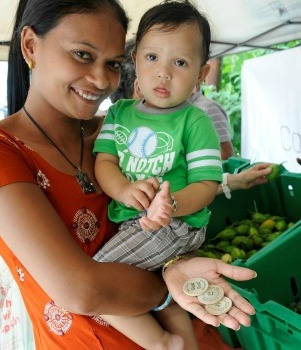“Superfood” is a buzzword that’s been thrown around a lot recently. It’s generally used to tout the health benefits of specific nutritionally dense foods. But the folks at nonprofit Wholesome Wave have shown that in addition to being essential for vital health, fresh, locally grown produce actually has many other superpowers, as well—such as helping economically disadvantaged families  stay healthier, for a start.
stay healthier, for a start.
Imagine this situation that low-income parents face daily: You rely heavily on government benefits to get food on the table, and regularly have to stretch just a few dollars to buy and cook dinner for your family. When a pack of ramen noodles costs under 20 cents and boxed mac ’n’ cheese can be had for 50 cents, a parent faced with hungry children is unlikely to choose a $2 head of organic broccoli (that she then has to prep and cook) instead of inexpensive convenience foods, which are precisely engineered to tantalize kids’ taste buds.
The hidden costs of “cheap” food
This situation is leading to a public health catastrophe, and the consequences will be immense (and costly) if it is not curtailed. Because many of the least expensive and most accessible foods are also over-processed and filled with fat, salt and sugar (as well as other additives), the number of overweight and undernourished children and adults has risen greatly, along with rates of obesity-related diseases found in very young children.
Studies show that children from poor families are most likely to be obese and mothers in food-insecure families will often limit their food intake so their children can eat, setting them up for obesity as well.
Farmer, chef and healthy food advocate
By making fresh, locally grown fruits and vegetables available and affordable, Wholesome Wave enables underserved community members to make healthier food choices. Founder Michel Nischan is the son of farmers who became a celebrity chef and award-winning author. He then followed his convictions and his passion, founding Wholesome Wave in 2007 in order to advocate for a more healthful, organic and sustainable food future.
Innovation at work
 With Nischan at the helm, Wholesome Wave has rolled out several trailblazing programs that help improve health outcomes among low-income families, generate additional revenue for small- and mid-sized farm businesses, and bolster local and regional economies—as well as reducing the ecological food footprint. Programs are currently running in 25 states and Washington, D.C., with more than 3,500 farmers and 350 markets participating.
With Nischan at the helm, Wholesome Wave has rolled out several trailblazing programs that help improve health outcomes among low-income families, generate additional revenue for small- and mid-sized farm businesses, and bolster local and regional economies—as well as reducing the ecological food footprint. Programs are currently running in 25 states and Washington, D.C., with more than 3,500 farmers and 350 markets participating.
One such program, the Fruit and Vegetable Prescription Program works hand in hand with physicians, families and farmers markets to provide resources for overweight and obese children and their families. Another, the Double Value Coupon Program doubles the value of low-income consumers’ federal nutrition benefits when spent at farmers markets on locally grown fruits and vegetables.
Ride the Wholesome Wave
If all that great news has whet your appetite to learn more about the state of our food system and what we can do to help, follow along with the Farm to Table Cycle: A Journey for Change. Sponsored by Wholesome Wave, photographer, bicyclist and advocate Glenn Charles is taking a 16-day, 400-mile journey, cycling through New England to raise awareness about local food systems. Check the web updates to keep up with Glenn, and to learn more about farming and sustainability, dairy and livestock production, farm-to-table chefs, local food processing and institutional food purchasing.
“What you will see is that "farm-to-table" is the way of the future," says Michel. "This ride tells story of so many Americans who work tirelessly to shape our food system into one that is more equitable, more sustainable and more delicious.” In Michel's estimation, and now in his own experience, “food can fix anything.”






